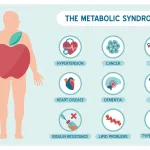Certain everyday habits, such as staying active and choosing a nutrient-dense diet high in protein and fiber, can help support balanced hormones naturally.
Hormones are chemical messengers that profoundly influence your mental, physical, and emotional well-being. For example, they are central to regulating hunger, body weight, and mood.

Your body normally synthesizes the exact amounts of each hormone required for different functions to keep you healthy.
However, inactive lifestyles and typical Western eating patterns can disrupt your hormonal milieu. In addition, levels of some hormones decline as you age, and some people experience sharper drops than others.
A healthy diet and other positive lifestyle choices can support your hormonal health and help you feel and perform at your best.
Read on to discover practical ways to balance your hormones naturally.
Eat enough protein at every meal
Getting sufficient protein is extremely important.
Protein supplies essential amino acids your body can’t produce itself, and it’s also necessary for making peptide hormones — hormones derived from protein.
Peptide hormones are vital for controlling numerous physiological functions, including growth, energy metabolism, appetite, stress response, and reproduction.
Research indicates that eating protein can lower the hunger hormone ghrelin and boost production of hormones that promote satiety.
Experts advise consuming at least 25–30 grams of protein per meal. You can reach this by including protein-rich foods such as:
- eggs
- chicken breast
- lentils
- fish
Engage in regular exercise
Physical activity has a powerful impact on hormonal health. Beyond enhancing blood flow to muscles, exercise increases hormone receptor sensitivity, improving nutrient delivery and hormonal signaling.
A key advantage of exercise is its ability to lower insulin levels and raise insulin sensitivity.
Insulin is the hormone that enables cells to absorb glucose from the bloodstream for energy. If you develop insulin resistance, cells respond poorly to insulin, increasing the risk of diabetes, obesity, and heart disease.
While some scientists debate whether improvements stem from exercise itself or from weight/fat loss, evidence suggests regular physical activity may enhance insulin resistance even without significant changes in weight or fat mass.
Various forms of exercise help prevent insulin resistance, including high-intensity interval training, resistance training, and aerobic activities.
For individuals unable to do high-intensity workouts, even routine walking can raise key hormone levels, potentially boosting strength and quality of life.
Maintain a moderate weight
Gaining excess weight is closely linked to hormonal disruptions that can negatively affect insulin sensitivity and reproductive health.
Obesity is a major driver of insulin resistance, whereas losing surplus weight is associated with improvements in insulin sensitivity and reduced risk of diabetes and cardiovascular disease.
Research suggests eating within your individualized calorie needs helps preserve hormonal balance and a healthy body weight.
Take care of your gut health
Your gut hosts more than 100 trillion beneficial microbes that produce metabolites capable of affecting hormones both positively and negatively.
The gut microbiome influences hormones by modulating metabolic pathways and immune signaling.
Below are strategies to support a healthy gut bacterial community, which may also aid hormonal equilibrium.
Lower your sugar intake
Cutting back on added sugars can be crucial for optimizing hormone function and avoiding obesity, diabetes, and related illnesses.
Sugar-sweetened beverages are the biggest source of added sugars in Western diets, and fructose is widely used in sodas, fruit drinks, and many sports and energy beverages.
Fructose consumption has risen dramatically in the U.S. since around 1980, and studies suggest that added sugars promote insulin resistance — some effects independent of total calories or weight gain.
Reducing sugary drinks and other sources of added sugar may benefit your hormonal health.
Try stress reduction techniques
Stress negatively affects hormones in multiple ways. Cortisol, often called the stress hormone, helps the body handle prolonged stress.
When you face stress, a cascade of responses triggers cortisol production. Normally, once the stressor passes, this response winds down.
However, chronic stress can disrupt the feedback loops that restore hormonal systems to baseline.
Persistent stress leads to elevated cortisol levels, which can stimulate appetite and increase cravings for sugary and high-fat foods. This may result in overeating and weight gain.
Focus on reducing everyday stressors and try to set aside at least 5 minutes per day for stress-relief activities.
Consume healthy fats
Including quality natural fats in your eating pattern may help lower insulin resistance and curb appetite.
Medium-chain triglycerides (MCTs) are a special type of fat that are less prone to storage in adipose tissue and more likely to be metabolized by the liver for immediate energy, which can raise calorie burning.
Healthy fats like omega-3s support insulin sensitivity and help prevent cortisol from rising excessively during stress.
Sources of these beneficial fats include:
- pure MCT oil
- avocados
- almonds
- peanuts
- macadamia nuts
- fatty fish
Get consistent, high quality sleep
No matter how clean your diet or disciplined your training, sufficient restorative sleep is essential for overall health.
Poor sleep contributes to disruptions in multiple hormones, including insulin, cortisol, leptin, ghrelin, and growth hormone.
Your brain requires uninterrupted sleep to complete all five stages of each sleep cycle. This is particularly important for growth hormone, which is predominantly released during deep sleep at night.
To support healthy hormonal function, aim for at least seven hours of good-quality sleep each night.
Follow a high fiber diet
Dietary fiber is a cornerstone of healthy eating.
Studies have found that fiber improves insulin sensitivity and promotes the release of hormones that increase feelings of fullness.
While soluble fiber tends to have the strongest effect on appetite by boosting satiety hormones, insoluble fiber also contributes to overall benefits.
Include several fiber-rich foods daily, such as avocados, beans, and nuts.
Consider following the Mediterranean diet
Estrogen plays a role in reproductive health for both women and men, and affects blood sugar regulation, immune function, and brain health.
Your dietary choices can influence estrogen levels.
Research indicates that the Western diet — heavy in refined sugars and animal-based foods — is associated with higher estrogen levels, which can raise the risk of breast and ovarian cancers.
Conversely, a Mediterranean-style diet rich in whole grains, fish, and cruciferous vegetables may help lower estrogen levels and thereby reduce cancer risk.
The bottom line
Hormones are involved in virtually every aspect of your health and are required in precise amounts for optimal bodily function.
Hormonal imbalances can heighten the likelihood of obesity, diabetes, heart disease, and other conditions.
Although aging and some other factors that influence hormones are beyond your control, you can take many steps to help manage and support healthy hormone levels.
Eating nourishing foods, staying physically active, and adopting other supportive habits like meditation and adequate sleep can substantially improve your hormonal well-being.

























Leave a Reply
You must be logged in to post a comment.